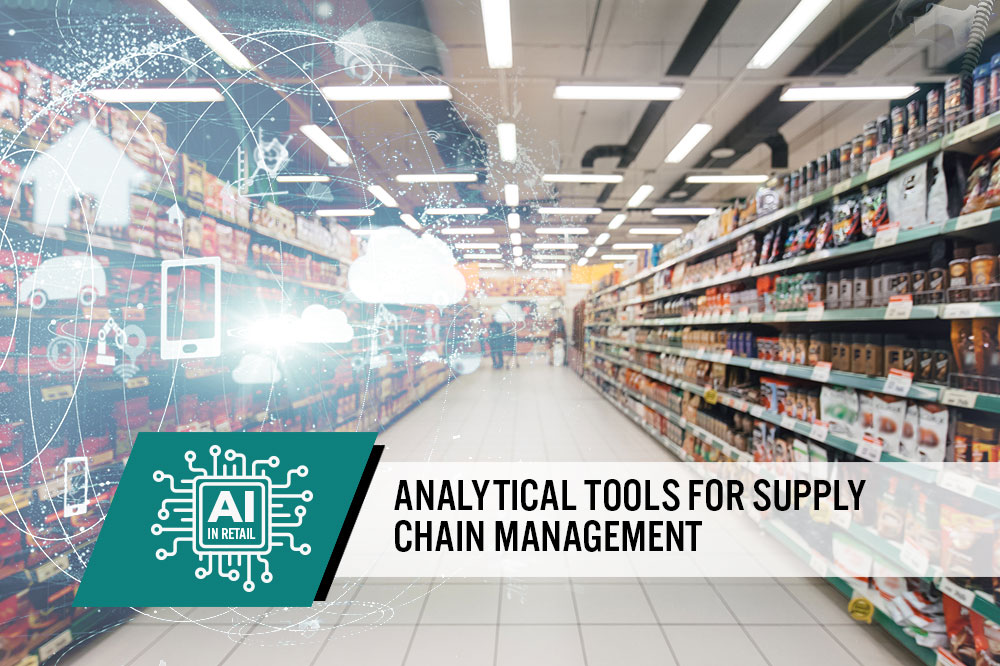
DIpil Das
What’s the Story?
- Smarter customer engagement
- Communication
- Operational efficiency
- Removing friction
- E-commerce and omnichannel
Bringing Offline Grocery Retail Online
The outbreak of Covid-19 accelerated the process of digitalization for many companies—especially in the grocery sector, as online demand surged in response to lockdowns. While grocery retail has traditionally been a low-margin and predominantly offline business, US grocery retailers have been pouring investment into digitalization efforts to cater to shopper expectations for e-commerce and to help address the threat from digital-first rivals such as Amazon. Numerous technologies promise to assist grocery retailers in their search for these solutions—with AI emerging as a common theme. As show in Figure 1, our proprietary SCORE framework details five high-value applications of AI to grocery retail businesses. [caption id="attachment_115970" align="aligncenter" width="700"]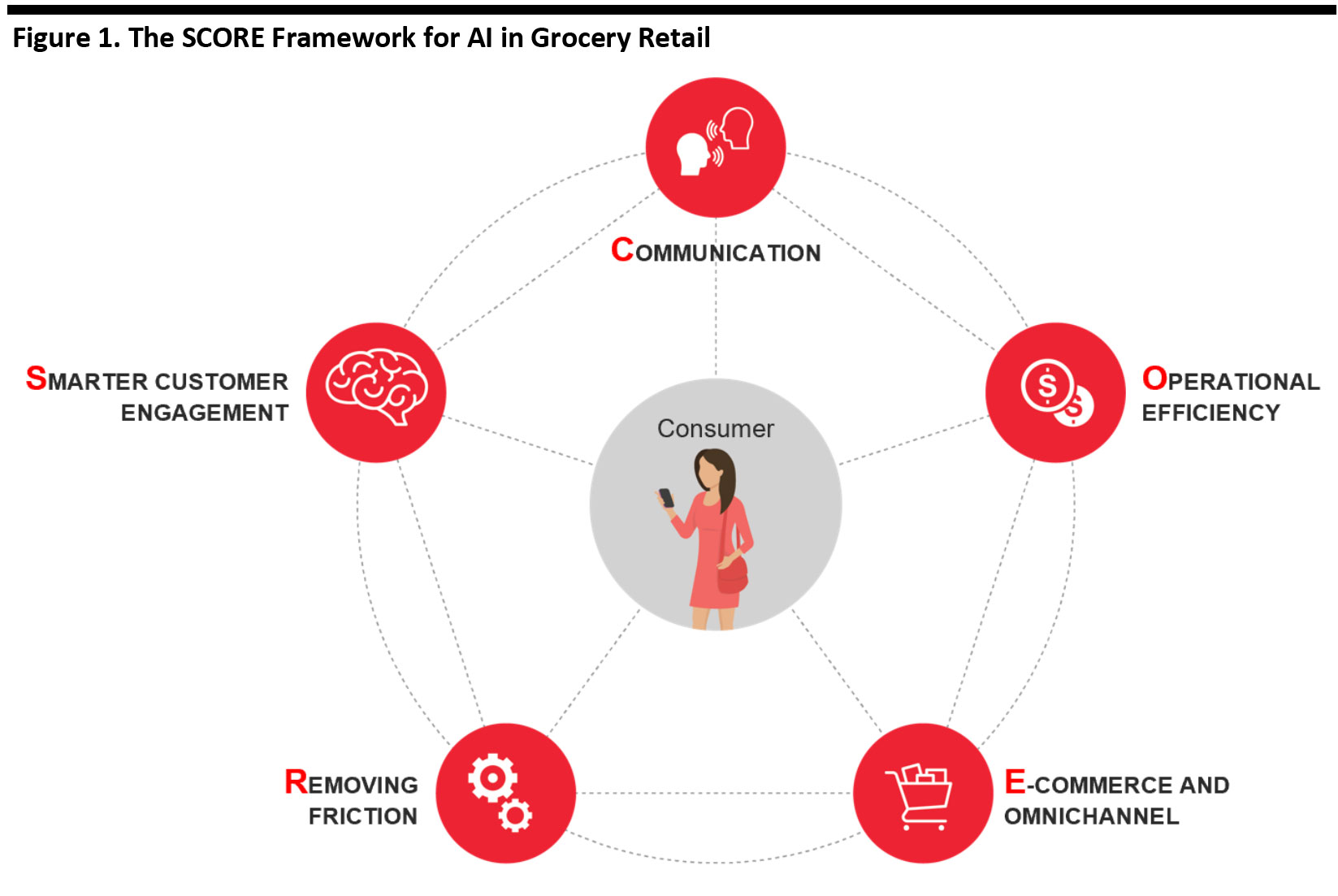 Source: Coresight Research[/caption]
Leveraging AI To Improve Operational Efficiency
In this report, we focus on the operational efficiency component of the SCORE framework. AI can be used to optimize pricing based on a mix of external and internal data—it can forecast demand, manage and allocate inventory, and support the optimization of assortments. As illustrated in Figure 2, AI can also be applied to reduce labor costs in areas such as store maintenance, checkout and automated distribution centers.
[caption id="attachment_115971" align="aligncenter" width="700"]
Source: Coresight Research[/caption]
Leveraging AI To Improve Operational Efficiency
In this report, we focus on the operational efficiency component of the SCORE framework. AI can be used to optimize pricing based on a mix of external and internal data—it can forecast demand, manage and allocate inventory, and support the optimization of assortments. As illustrated in Figure 2, AI can also be applied to reduce labor costs in areas such as store maintenance, checkout and automated distribution centers.
[caption id="attachment_115971" align="aligncenter" width="700"]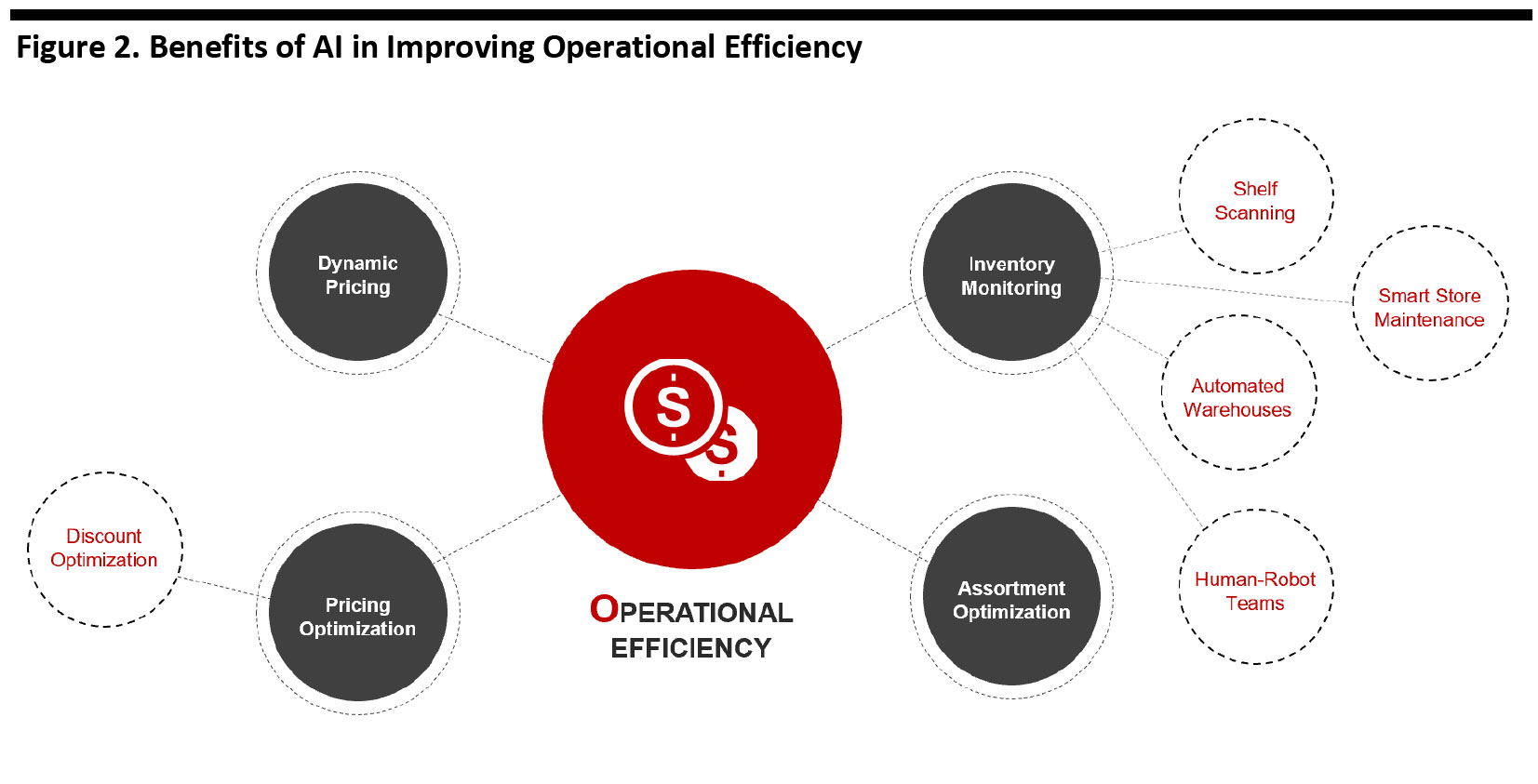 Source: Coresight Research[/caption]
AI-Driven Supply-Chain Platforms
AI can be applied to optimize almost every aspect of the retail supply chain. In terms of operational efficiency, this can be focused on demand forecasting, manufacturing, warehousing, sales, last-mile delivery and customer relationship management. Combining AI and machine learning (ML) in supply chain platforms can streamline logistics process and provide retailers with insights into demand forecasting and inventory levels.
For demand forecasting, compared to human demand forecasters, the combination of AI/ML and quantitative techniques offers numerous advantages:
Source: Coresight Research[/caption]
AI-Driven Supply-Chain Platforms
AI can be applied to optimize almost every aspect of the retail supply chain. In terms of operational efficiency, this can be focused on demand forecasting, manufacturing, warehousing, sales, last-mile delivery and customer relationship management. Combining AI and machine learning (ML) in supply chain platforms can streamline logistics process and provide retailers with insights into demand forecasting and inventory levels.
For demand forecasting, compared to human demand forecasters, the combination of AI/ML and quantitative techniques offers numerous advantages:
- Faster computational speeds
- Increased accuracy
- Real-time updates
- Ability to analyze more data
- Ability to locate hidden patterns in data
- Represents a robust system
- Adapts to changes faster
- Ability to handle significant complexity
Grocery Retailers Collaborate with Technology Vendors on AI
Grocery retailers are turning to technology vendors to collaborate on AI-driven supply chain management within their operations. The smart platform solutions from these vendors tend to incorporate AI and ML to offer daily forecasts for each item and each point of sale. For example, technology vendor Blue Yonder provides supply chain management solutions to Ahold Delhaize, Albertsons, Morrisons (UK) and Safeway, among other grocers. According to the company, its software-as-a-service forecasting solution can reduce out-of-stock rates by up to 30%, with a forecast accuracy of up to 95%. In July 2020, Blue Yonder acquired Yantricks, a commerce and fulfillment microservice provider, aiming to create an end-to-end solution that centers the supply chain around consumers’ preferences and choices. In addition, established companies such as Logility, are active in this spaces, as well as startups with sector-specific specializations, such as Afresh Technologies. [caption id="attachment_115972" align="aligncenter" width="700"]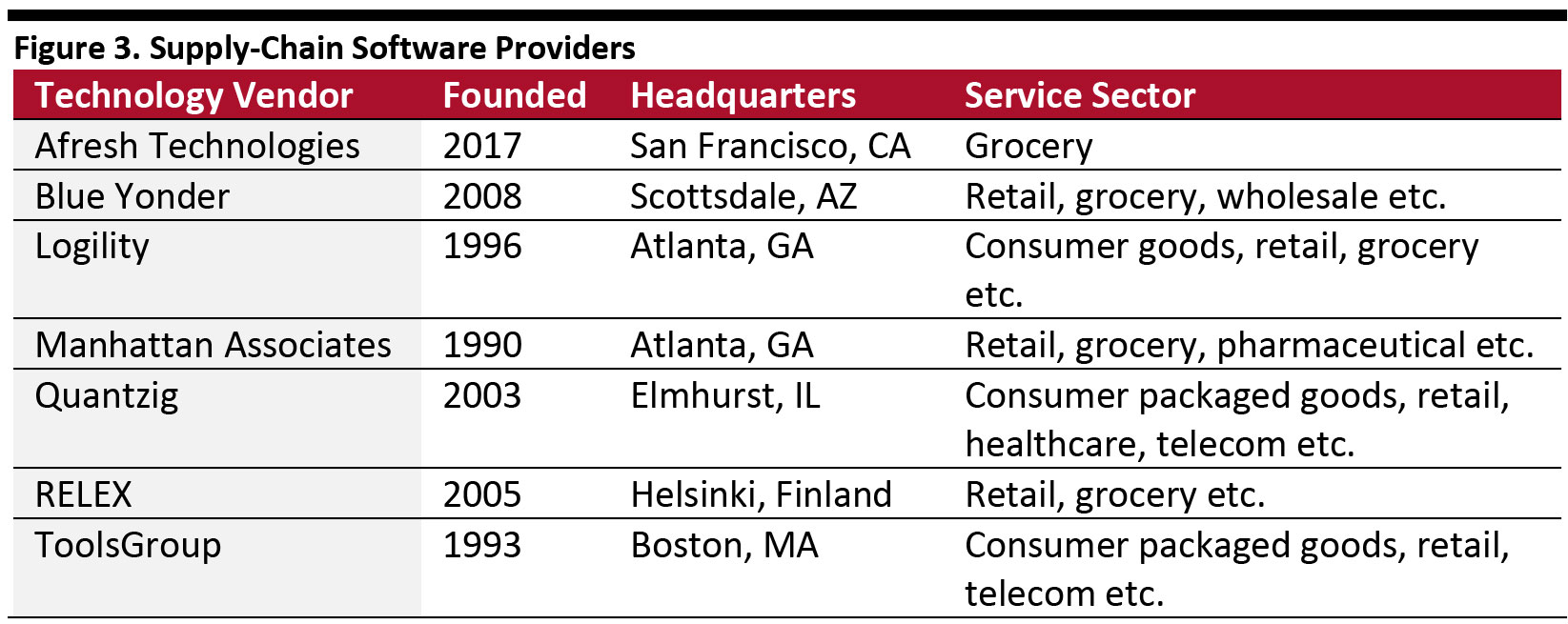 Source: Company reports/Coresight Research[/caption]
· Walmart’s New Intelligence Retail Lab
In 2019, Walmart transformed its Neighborhood Market in Levittown, New York, into its new Intelligence Retail Lab (IRL). The company incorporated intelligence-enabled cameras, interactive displays and a massive data center into this IRL facility.
The IRL has approximately 50,000 square feet of real retail space, with capacity for over 30,000 items. Inside the store, the company set up a internet of things technologies, including sensors, cameras and processors. The length of cable used to connect hardware is enough to scale Mount Everest five times and the total processing power of the IRL is sufficient to download three years’ worth of music (27,000 hours) each second, according to the company.
When a product is out of stock at the IRL, a combination of cameras and real-time analytics will automatically trigger a notification on an internal app that alerts store associates to re-stock the item. Each step of this process incorporates AI—from identifying the product, to detecting and comparing quantities on the shelf, and assessing upcoming sales demand.
[caption id="attachment_115973" align="aligncenter" width="700"]
Source: Company reports/Coresight Research[/caption]
· Walmart’s New Intelligence Retail Lab
In 2019, Walmart transformed its Neighborhood Market in Levittown, New York, into its new Intelligence Retail Lab (IRL). The company incorporated intelligence-enabled cameras, interactive displays and a massive data center into this IRL facility.
The IRL has approximately 50,000 square feet of real retail space, with capacity for over 30,000 items. Inside the store, the company set up a internet of things technologies, including sensors, cameras and processors. The length of cable used to connect hardware is enough to scale Mount Everest five times and the total processing power of the IRL is sufficient to download three years’ worth of music (27,000 hours) each second, according to the company.
When a product is out of stock at the IRL, a combination of cameras and real-time analytics will automatically trigger a notification on an internal app that alerts store associates to re-stock the item. Each step of this process incorporates AI—from identifying the product, to detecting and comparing quantities on the shelf, and assessing upcoming sales demand.
[caption id="attachment_115973" align="aligncenter" width="700"]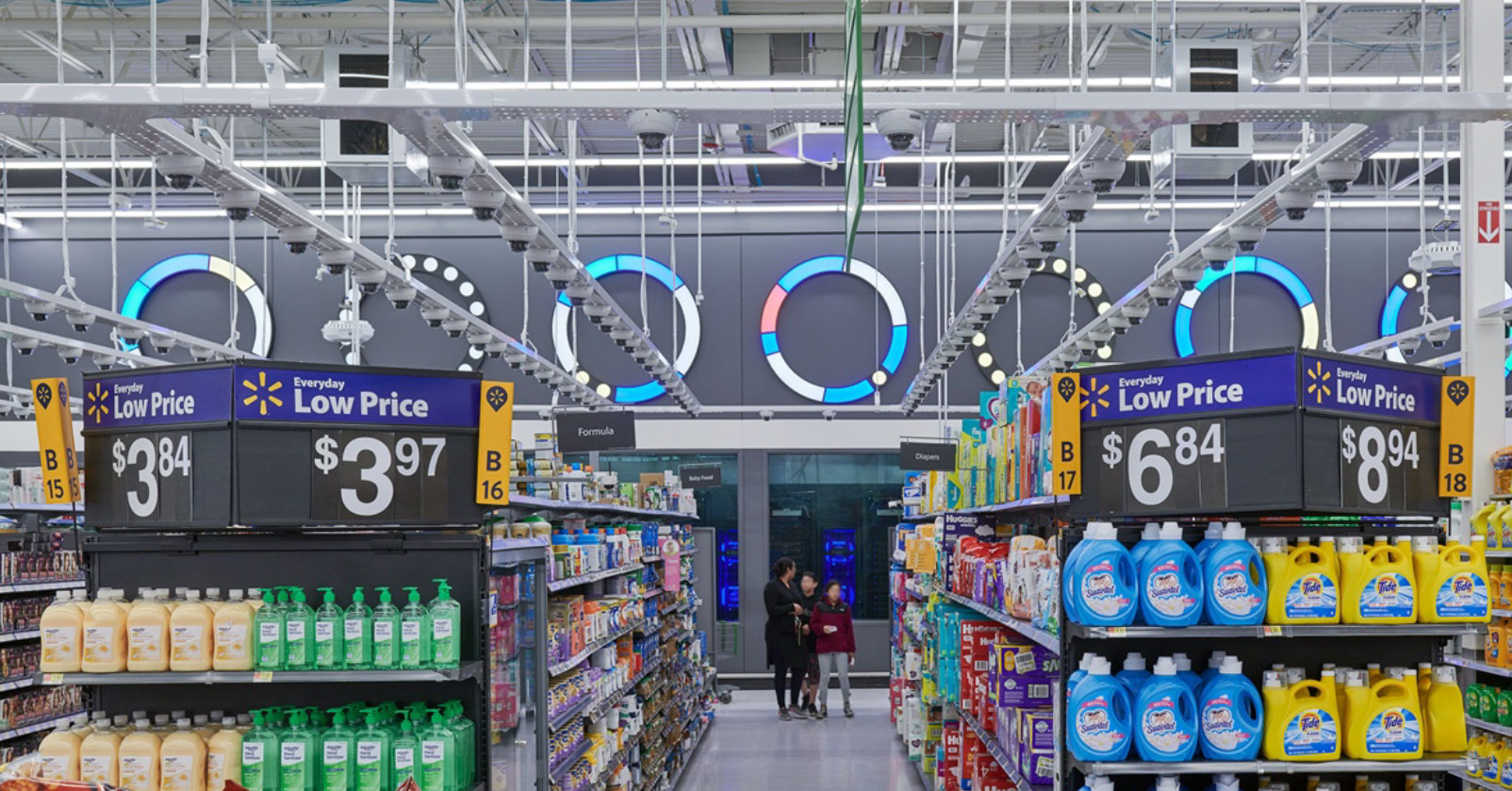 Walmart IRL
Walmart IRL Source: Walmart [/caption] · Fresh Thyme Leverages AI Tools To Reduce Food Waste Fresh Thyme, a farmers market style grocery store, has partnered with Afresh Technologies—the first AI-driven fresh food optimization platform for grocers—to reduce food waste in its stores. The company started testing its in-store Fresh Replenishment tools across 75 stores. The Fresh Replenishment platform leverages AI to achieve warehouse inventory, procurement and pricing optimization. By improving operational efficiency, grocery retailers can reduce waste and increase profit. · Finnish Grocery Retailer S Group Incorporates AI Platforms S Group is a leading grocery retailer in Finland, running over 1,000 grocery stores across the country. The company has been working with RELEX, an AI-based optimization solution provider, to improve store replenishment efficiency and increase profit. Founded in 2005, RELEX incorporates AI into its Living Retail Platform to improve demand forecasting and automatic replenishment processes. The platform enables retailers to optimize space, workforce and pricing through a single unified system. It helps retailers to make faster and more accurate autonomous decisions and stay competitive in the grocery landscape. As of 2019, S Group had implemented this AI-based solution in almost 200 of its stores, with the aim of increasing visibility and efficiency for in-store replenishment. Supply Chain Platforms: Recent Funding Activities · Crisp—a demand forecasting platform for the food industry Based in New York, the company raised $12 million in series A funding in July 2020. This is in addition to the $14.2 million previously raised by the company, bringing the total funding to $26.2 million. Crisp offers cloud-based business intelligence tools to help retailers consolidate data. Its platform provides food suppliers and distributors with real-time data visualization as well as demand forecasting services. The platform’s function is to improve supply chain efficiency and reduce food waste—according to the company, its client Nounós Creamery saw an 80% reduction in scrapped inventory when testing the Crisp platform. · Afresh Technologies—an AI-driven fresh food optimization platform Based in Silicon Valley, Afresh Technologies announced a $12 million Series A follow-on round of funding in July 2020, bringing its funding total to $20 million. The company’s solution helps grocers to manage fresh food orders, inventory and merchandising. According to Afresh, the company has helped clients to increase fresh food sales by 3%, reduce in-store food waste by up to 50% and increase fresh food gross margins by four percentage points.